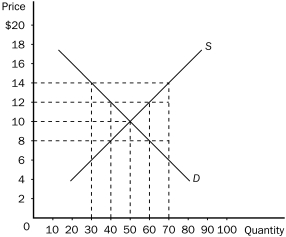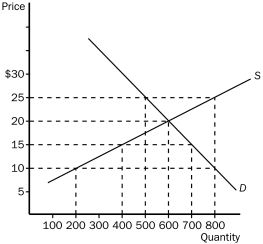Exam 4: The Market Forces of Supply and Demand
Exam 1: Ten Principles of Economics237 Questions
Exam 2: Thinking Like an Economist267 Questions
Exam 3: Interdependence and the Gains From Trade217 Questions
Exam 4: The Market Forces of Supply and Demand303 Questions
Exam 5: Elasticity and Its Applications282 Questions
Exam 6: Supply, demand, and Government Policies252 Questions
Exam 7: Consumers, producers, and the Efficiency of Markets248 Questions
Exam 8: Application: the Costs of Taxation245 Questions
Exam 9: Application: International Trade245 Questions
Exam 10: Externalities288 Questions
Exam 11: Public Goods and Common Resources258 Questions
Exam 12: The Design of the Tax System328 Questions
Exam 13: The Costs of Production303 Questions
Exam 14: Firms in Competitive Markets271 Questions
Exam 15: Monopoly306 Questions
Exam 16: Oligopoly291 Questions
Exam 17: Monopolistic Competition257 Questions
Exam 18: The Markets for the Factors of Production284 Questions
Exam 19: Earnings and Discrimination286 Questions
Exam 20: Income Inequality and Poverty247 Questions
Exam 21: The Theory of Consumer Choice238 Questions
Exam 22: Frontiers of Microeconomics199 Questions
Exam 23: Measuring a Nations Income215 Questions
Exam 24: Measuring the Cost of Living208 Questions
Exam 25: Production and Growth240 Questions
Exam 26: Saving, investment, and the Financial System282 Questions
Exam 27: The Basic Tools of Finance249 Questions
Exam 28: Unemployment242 Questions
Exam 29: The Monetary System277 Questions
Exam 30: Money Growth and Inflation224 Questions
Exam 31: Open-Economy Macroeconomics: Basic Concepts256 Questions
Exam 32: A Macroeconomic Theory of the Open Economy217 Questions
Exam 33: Aggregate Demand and Aggregate Supply302 Questions
Exam 34: The Influence of Monetary and Fiscal Policy on Aggregate Demand249 Questions
Exam 35: The Short Run Trade Off Between Inflation and Unemployment246 Questions
Exam 36: Five Debates Over Macroeconomic Policy140 Questions
Select questions type
It is not possible for demand and supply to shift at the same time.
Free
(True/False)
4.7/5  (42)
(42)
Correct Answer:
False
Which of the following would not be a determinant of the demand for a particular good?
Free
(Multiple Choice)
4.9/5  (31)
(31)
Correct Answer:
D
If buyers and sellers in a certain market are price takers,then individually
Free
(Multiple Choice)
4.8/5  (30)
(30)
Correct Answer:
A
Figure 4-8
 -Refer to Figure 4-8.In this market,equilibrium price and quantity,respectively,are
-Refer to Figure 4-8.In this market,equilibrium price and quantity,respectively,are
(Multiple Choice)
4.7/5  (35)
(35)
Warrensburg is a small college town in Missouri.At the end of August each year,the market demand for fast food in Warrensburg
(Multiple Choice)
4.9/5  (31)
(31)
The positive relationship between price and quantity supplied is called
(Multiple Choice)
4.9/5  (41)
(41)
The dictionary defines equilibrium as a situation in which forces
(Multiple Choice)
4.7/5  (37)
(37)
To find the market demand for a product,individual demand curves are summed
(Multiple Choice)
4.9/5  (40)
(40)
Figure 4-9
 -Refer to Figure 4-9.If the price is $25,there would be an
-Refer to Figure 4-9.If the price is $25,there would be an
(Multiple Choice)
4.9/5  (38)
(38)
Which of the following is not a characteristic of a perfectly competitive market?
(Multiple Choice)
4.8/5  (27)
(27)
What will happen to the equilibrium price and quantity of traditional camera film if traditional cameras become more expensive,digital cameras become cheaper,the cost of the resources needed to manufacture traditional film falls and more firms decide to manufacture traditional film?
(Multiple Choice)
4.8/5  (32)
(32)
Two goods are substitutes if a decrease in the price of one good
(Multiple Choice)
5.0/5  (26)
(26)
The sum of all individual demand curves for a product is called
(Multiple Choice)
4.7/5  (38)
(38)
When there is a shortage of 100 units of a particular good,
(Multiple Choice)
4.7/5  (29)
(29)
Table 4-3. The demand schedule below pertains to sandwiches demanded per week.
 -Refer to Table 4-3.Regarding Alfred and Belinda,whose demand for sandwiches conforms to the law of demand?
-Refer to Table 4-3.Regarding Alfred and Belinda,whose demand for sandwiches conforms to the law of demand?
(Multiple Choice)
4.8/5  (41)
(41)
Showing 1 - 20 of 303
Filters
- Essay(0)
- Multiple Choice(0)
- Short Answer(0)
- True False(0)
- Matching(0)